|
What's
New in K3CCDTools 2
Introduction
K3CCDTools 2 has brand new core open for further
enhancement while keeping the well known K3CCDTools'
speed.
Both video capture core and sequence processing core were
rebuilt.
K3CCDTools 2 is now a project with 180000 lines of
source code (3x more than K3CCDTools 1).
See also:
What's
new in K3CCDTools 2.1.2
What's
new in K3CCDTools 2.1.3
What's
new in K3CCDTools 2.2.4
What's
new in K3CCDTools 2.3.5
What's
new in K3CCDTools 2.4.6
What's
new in K3CCDTools 2.4.7
What's
new in K3CCDTools 2.4.8
What's
new in K3CCDTools 2.4.9
Video Capture
New video capture core supports 3 capturing
technologies:
1, Video for
Windows (VFW) -
known from K3CCDTools 1 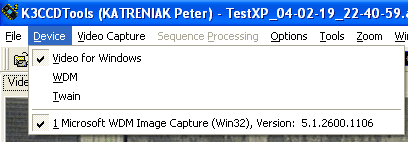
Features:
- rather old technology from 90’s, but
still offers some useful features like
single frame capturing
- disadvantages:
- slow preview speed
- multiple web-cams are mapped through a
single WDM capture device
The picture above shows VFW device list when 3
webcams are connected to computer - only one WDM
mapping device is visible, so it is not possible
to select required camera from the menu directly.
See also 2
webcams connected to a single computer.
|
2, Windows
Driver Model (WDM) - modern video
capture technology
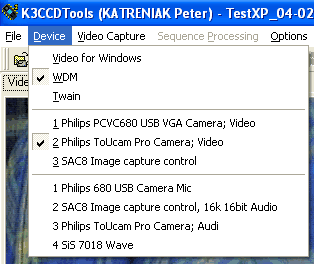 |
|
Features:
- based on DirectX technology
- supports new hardware
- fast
- ideal for focusing
- each web-cam is individually
accessible
|
| |
|
|
|
3,
TWAIN interface
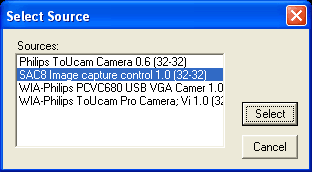 |
|
Features:
- interface originally developed
for scanners
- single frame capture with better
quality
- necessary
for supporting JG modification (SAC8
cameras)
|
| |
|
|
|
Brightness Level Meter
It was also reworked, now it offers many variable
options:

min/max for each
of LRGB
components |

histogram for each
of LRGB
components |

min/max for RGB color
balance |

RGB color
balance with histogram |
Variability of level meter settings is achieved by
using various combinations of settings:
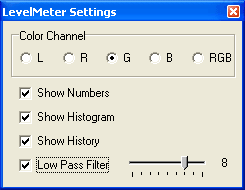 |
|
Low pas
filter suppresses brightness
fluctuations caused by atmospheric turbulence. It
makes star focusing easier. Simple star
focusing:
1, Aim scope to a single star
2, Set such camera exposure that star is not
saturated
3, Try to focus the scope to achieve the highest
brightness
|
Big Display

It shows details about capturing and enables to watch
capture process from longer distance.
Port Commander
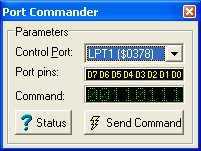
It enables to directly control camera's parallel /
serial port. Very useful for camera developers and
testers...
Drift Explorer + Autoguiding
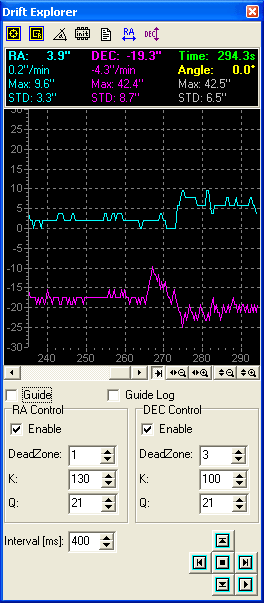 |
|
Supports the following
autoguiding protocols:
- LX200
- Astromeccanica DA-1
- PISCO interface and modified
GEM1 mount
- Modified TAL interface
- File interface
Features:
- Real-time Periodic Error graph
- Variable scales in horizontal and
vertical axis
- Periodic error and drift is shown in
graph in arcseconds
- Real-time drift display
- Enables accurate polar alignment in 10-15
minutes
- Camera angle measuring and correction
- Realtime statistics - actual error,
trend, maximum error, standard deviation
|
Sequence Processing
New reworked core supports:
- much more formats for sequence processing:
- variety of color depths: 8-/16-/24-/32-/48-/96-bit
- variety of input
formats: AVI,
JPG, BMP, PNG, TIFF, TIFF 16/48, FIT 16, FIT 32
- variety of output
formats: AVI,
JPG, BMP, PNG, TIFF, TIFF 16/48, FIT 16, FIT 32
- processing of several
AVI files at once like if it was
only 1 file
- support for 16/48
bit dark frames & flat fields
offers getting even more information from the
stacked/summed picture
Input Filters for
Sequence Processing
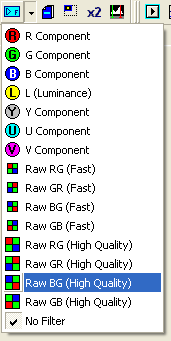 |
|
The filter
architecture enables to select
only required component for
processing.
Thereby it is possible to process e.g. green
component of color RGB sequence. Or it is
possible to process only Y
component of AVI file.K3CCDTools 2 also offers
color de-bayer filters for
processing Color
RAW sequencies (images
or AVI files).
There are 2 sets of de-bayer filters:
- fast - for fast processing
- HighQuality - for final processing
|
Sequence Properties
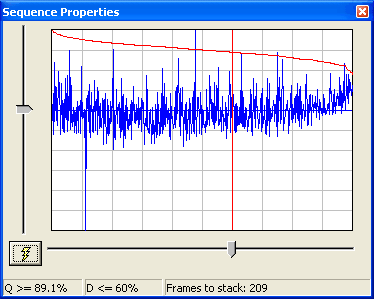
Sequence Properties dialog shows sequence quality
and difference graph and enables to filter low
quality or high difference frames from stacked selection.
New Enhanced Planeraty Wizard
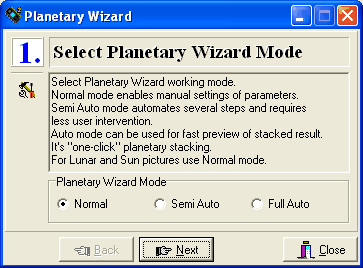
New Planetary Wizard gives you more
possibilities while processing planetary AVI/Image
sequences:
- 3 modes: Normal, Semi Auto, Full Auto
- better user interface
- more user control in Normal mode enables to
influence more the result picture
- Semi Auto and Full Auto modes are especially
useful for novice, but still enable an
experienced user to tweak the individual
procedure steps
- Full Auto mode is "one touch"
solution for getting fast preview of captured
planets
Telescope and Camera Settings
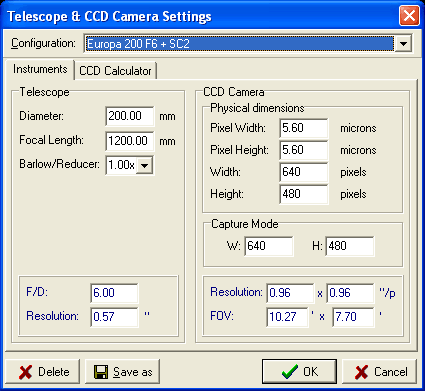
New user interface and data handling
enables to select required combination of scope, barlow
lens or focal reducer and camera directly from
Configuration combo box.
Open Dialog
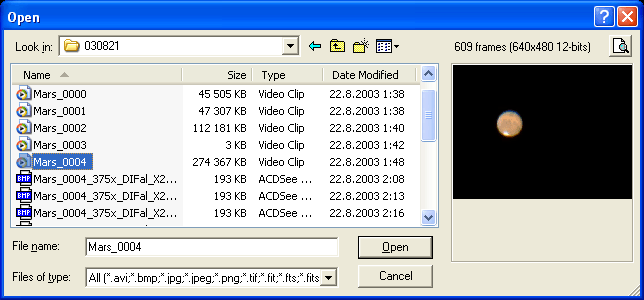
Displays all input formats in preview window and shows
more information.
It is really invaluable help e.g. when working with 16-/48-bit
flat fields and dark frames.
Additional Tools for Sequence Processing
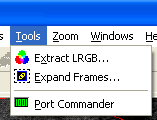
- Extract L/R/G/B components from
group of pictures or AVI sequence:
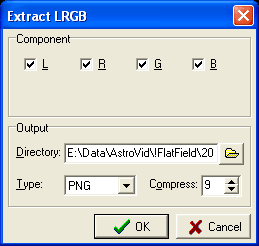
- Expand frames - expands group
of pictures to the same size
(very useful for stacking of images of different sizes):
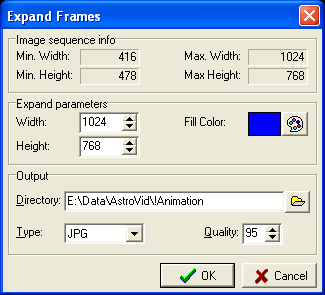
Other New Features
- Blinking comparison of any two
frames of processed sequence. It is extremely useful for
aligning seuqencies which have difficulties with
automatical alignment (Lunar eclipse, Mercury or Venus
transit, etc.)
- Enhanced file naming in Video Capture
mode - enables automatic usage of date-time in files
naming
- Night Vision mode
- Import of Registax project files for
stacking in K3CCDTools 2
- ... and others
Back to K3CCDTools Features page
Computer generated
images, real images, drawings and texts are property of
the author and may not be reproduced or used without
permission of author.

Last
Update: 12.09.2005
|